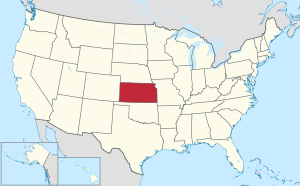
Back Kansas Afrikaans ካንሳስ Amharic Kansas AN Cǣnsas ANG كانساس Arabic ܟܐܢܣܐܣ ARC كانساس ARY كانزاس ARZ Kansas AST Kansas suyu Aymara
Kansas (/ˈkænzəs/ ⓘ KAN-zəss)[11] is a landlocked state in the Midwestern region of the United States.[12] It borders Nebraska to the north; Missouri to the east; Oklahoma to the south; and Colorado to the west. Kansas is named after the Kansas River, in turn named after the Kansa people.[13][14][15][16] Its capital is Topeka, and its most populous city is Wichita; however, the largest urban area is the bi-state Kansas City metropolitan area split between Kansas and Missouri.
For thousands of years, what is now Kansas was home to numerous and diverse Indigenous tribes. The first settlement of non-indigenous people in Kansas occurred in 1827 at Fort Leavenworth. The pace of settlement accelerated in the 1850s, in the midst of political wars over the slavery debate. When it was officially opened to settlement by the U.S. government in 1854 with the Kansas–Nebraska Act, conflict between abolitionist Free-Staters from New England and pro-slavery settlers from neighboring Missouri broke out over the question of whether Kansas would become a free state or a slave state, in a period known as Bleeding Kansas. On January 29, 1861,[17][18] Kansas entered the Union as a free state, hence the unofficial nickname "The Free State". Passage of the Homestead Acts in 1862 brought a further influx of settlers, and the booming cattle trade of the 1870s attracted some of the Wild West's most iconic figures to western Kansas.[19][20]
As of 2015, Kansas was among the most productive agricultural states, producing high yields of wheat, corn, sorghum, and soybeans.[21] In addition to its traditional strength in agriculture, Kansas possesses an extensive aerospace industry. Kansas, which has an area of 82,278 square miles (213,100 square kilometers) is the 15th-largest state by area, the 36th most-populous of the 50 states, with a population of 2,940,865[22] according to the 2020 census, and the 10th least densely populated. Residents of Kansas are called Kansans. Mount Sunflower is Kansas's highest point at 4,039 feet (1,231 meters).[23]
- ^ Riney-Kehrberg, Pamela. "Wholesome, Home-Baked Goodness: Kansas, the Wheat State" (PDF). Kansas History: A Journal of the Central Plains (Spring 2011). Kansas State Historical Society: 60–69. Archived (PDF) from the original on March 8, 2022. Retrieved April 25, 2022.
- ^ "New vanity tag rule spurs drivers' creativity". Archived from the original on March 10, 2010. Retrieved May 4, 2022.
- ^ a b c Geography, US Census Bureau. "State Area Measurements and Internal Point Coordinates". Archived from the original on March 16, 2018. Retrieved May 31, 2016.
- ^ Perlman, Howard. "Area of each state that is water". Archived from the original on June 25, 2016.
- ^ a b "Kansas Geography from NETSTATE". Archived from the original on June 4, 2016.
- ^ a b "Elevations and Distances in the United States". United States Geological Survey. 2001. Archived from the original on October 15, 2011. Retrieved October 21, 2011.
- ^ "United States Census Quick Facts Kansas". Retrieved January 9, 2025.
- ^ "Household Income in States and Metropolitan Areas: 2023" (PDF). Retrieved January 12, 2025.
- ^ "Median Annual Household Income". The Henry J. Kaiser Family Foundation. Archived from the original on December 20, 2016. Retrieved April 11, 2024.
- ^ "Governor's Signature Makes English the Official Language of Kansas". US English. May 11, 2007. Archived from the original on July 10, 2007. Retrieved August 6, 2008.
- ^ "Kansas". Merriam-Webster.com Dictionary. Merriam-Webster.
- ^ "Current Lists of Metropolitan and Micropolitan Statistical Areas and Delineations". Archived from the original on January 27, 2017.
- ^ "Kansas Historical Quarterly—A Review of Early Navigation on the Kansas River—Kansas Historical Society". Kshs.org. Archived from the original on September 22, 2022. Retrieved August 15, 2012.
- ^ "Kansas history page". Archived from the original on December 26, 2018. Retrieved April 13, 2019.
- ^ The Encyclopedia of Kansas (1994) ISBN 0-403-09921-8
- ^ John Koontz, p.c.
- ^ "Today in History: January 29". Memory.loc.gov. Archived from the original on July 27, 2010. Retrieved July 31, 2010.
- ^ "Kansas Quick Facts". governor.ks.gov. Archived from the original on May 11, 2011. Retrieved December 30, 2010.
- ^ Clavin, Thomas; Clavin, Tom (February 28, 2017). Dodge City: Wyatt Earp, Bat Masterson, and the Wickedest Town in the American West. St. Martin's Publishing Group. ISBN 978-1-250-07148-4. Archived from the original on March 29, 2024. Retrieved January 23, 2024.
- ^ Magazine, Smithsonian. "How Dodge City Became a Symbol of Frontier Lawlessness". Smithsonian Magazine. Archived from the original on January 6, 2024. Retrieved January 6, 2024.
- ^ "Kansas Agriculture". Kansas Department of Agriculture. Archived from the original on September 20, 2015. Retrieved September 14, 2015.
- ^ "2020 Census" (PDF). Census.gov. April 26, 2021. Archived (PDF) from the original on April 26, 2021. Retrieved April 26, 2021.
- ^ "Mount Sunflower—Kansas, United States • peakery". April 3, 2011. Archived from the original on April 3, 2011.
Cite error: There are <ref group=lower-alpha> tags or {{efn}} templates on this page, but the references will not show without a {{reflist|group=lower-alpha}} template or {{notelist}} template (see the help page).


